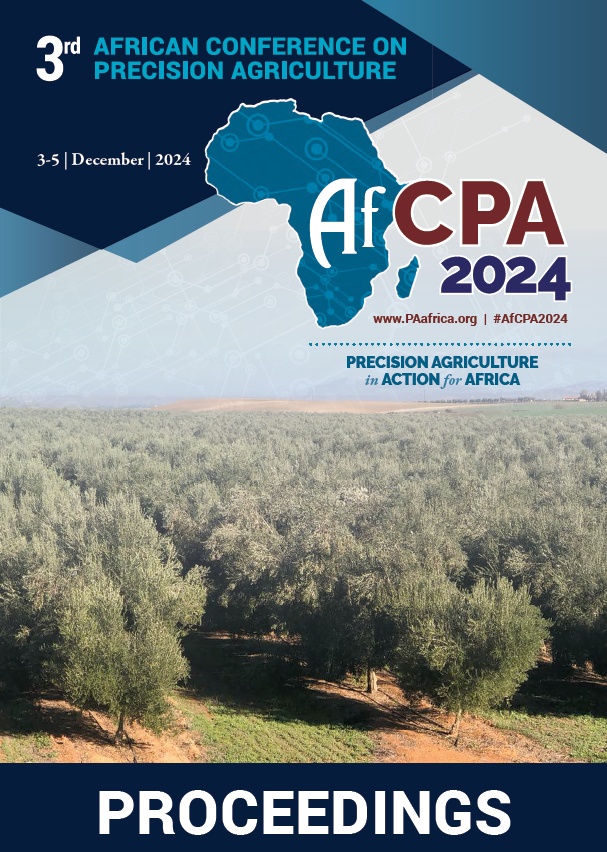Download the Conference Proceedings
Proceedings
Authors
| Filter results7 paper(s) found. |
|---|
1. Estimating greensnap yield damage with canopy reflectance: a case studyGrain yield reduction caused by storm-induced plant breakage (green snap) occurs often in corn fields. With climate change and an increasing frequency in the occurrence of extreme weather events, it is essential to develop methods that can accurately estimate green snap damage, so growers can be properly compensated by insurance companies for yield loss. Because plant breakage also affects crop canopy reflectance, this case study aimed to characterize the changes in crop canopy reflectance... G. Dias paiao, T.J. Nigon, F.G. Fernández, C. Cummings, S.L. Naeve |
2. Soil fertility mapping of Dry savannah zone of TogoIncreasing agricultural productivity and therefore the production requires a good knowledge of the soil fertility status and a sustainable nutrients management. The objective of this study is to map spatial distribution of some selected soil fertility parameters in the dry savannah agro-ecological zone that covers the regions of Savanes and Kara in Togo. Soil fertility parameters such as pH, available phosphorus (P), exchangeable potassium (K) and organic matter were determined in soil samples... K.K. Ganyo, K.A. Ablede , K. Koudjega, S. Ani, K. Afawoubo, D.A. Anoumou, A.T. Mensah, E. Assih-faram, M. Tchalla-kpondji, K. Kpemoua, Y. Lombo |
3. Determining Nutrients rates for Maize, Rice, Cotton, and Tomato in Dry Savannah zone of Togo based on site specific nutrient management approachInadequate fertilizer application limits crop yields and lead to the soil fertility depletion. This study aims at formulating nutrients rates recommendations for main the crops in dry savannah zone of Togo. Site specific nutrient management approach based on spatial variations in nutrients status, crops nutrients requirement and average crop yields under field conditions was used to determine recommendations rates in N, P and K. For maize cropping, nutrients needs are 94 kgN.ha-1, 42... |
4. Predicting in-Season Sorghum yield potential using Remote Sensing Approach: a case study of Kano in Sudan Savannah agro- ecological zone, NigeriaThe preliminary estimation of expected yields and the accuracy of this evaluation provide information for decision-making related to the harvest. Estimating crop yield using remote sensing techniques has proven to be successful, having the ability to provide yield estimates prior to harvest. This study was conducted to examine the applicability of Sentinel-2B for estimating sorghum yield during the 2018 rainy season in Bebeji, Dawakin-Kudu and Rano Local Government Areas Kano State, in the Sudan... A. Tukur, H.A. Ajeigbe, F.M. Akinseye, I.B. Mohammed, M.M. Badamasi |
5. Water Application Efficiency of an Ultisol in Response to Climate Change in Two Agroecological Zones of NigeriaIrrigation and fertilizer application are management practices farmers have adopted to increase food production for the growing population. This has improved crop nutrient absorption and the efficiency of fertilizer applied to the soil. This is essential to reduce plant water stress in a climate changing environment. This study investigated and compared water application efficiency under manual sprinkler irrigation with capillary irrigation method on ultisols located in rainforest and derived... I.A. Egbebi, D.J. Oyedele, F.O. Tijani, O.E. Egbebi |
6. Monitoring Grazing Goats' Behavior Using Sensors and Satellite Remote SensingThe recent development of new methods for remotely observing animal behavior using electronic sensors such as global positioning systems (GPS) and three-axis accelerometers to monitor and record behavior at different spatial and temporal scales presents real opportunities for better understanding and interpreting the behaviors of grazing animals. The goal of this study was to distinguish different behavioral categories of grazing goats by combining GPS collars, accelerometers, and satellite remote... Y. Chebli, S. El otmani, J. Cabaraux, M. Chentouf , A. Keli, F. Elame |
7. Benefits of Precision Agriculture in Sugarcane Farming: A case of KwaZulu-Natal, South Africa... N. Gumede |
